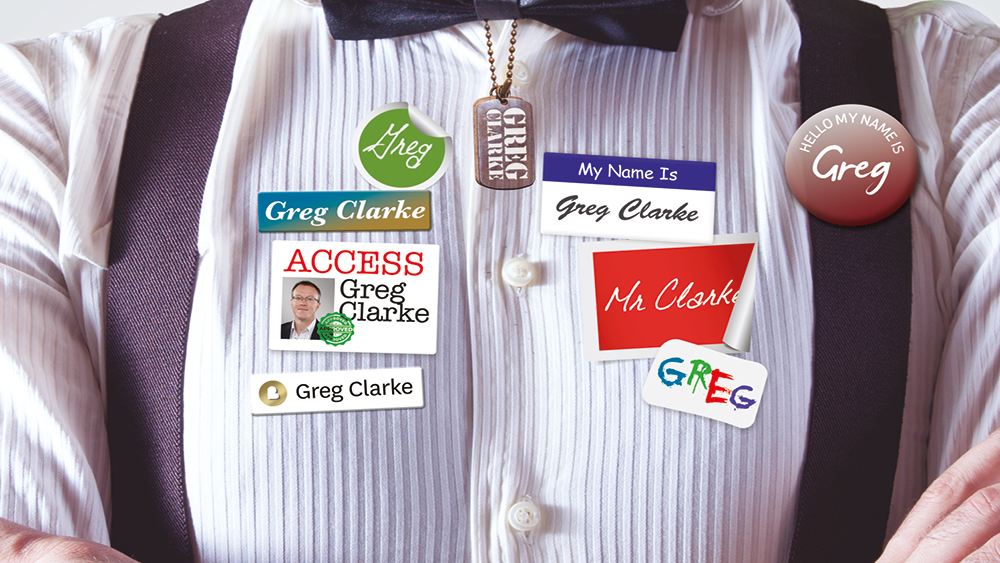In case you hadn’t noticed, I’m the Chairman of the FA Cup. I’m the former CEO of Lend Lease. And the Creative Director of Sydney’s Gay and Lesbian Mardi Gras. I also moonlight as a banjo player, a great comic illustrator and was for a while the tour manager for rock band Rose Tattoo.
This makes googling myself a fairly pointless exercise. Having a common name means I’ll never be just “Greg”, like “Cher” or “Beyonce”. And pursuing “Clarke” on Ancestry.com is like writing the Domesday Book.
People don’t know what a Christian is.
You might get the impression this bothers me, but you would be wrong – although it does have some impact on how I present myself. I never expect my name to distinguish me, as you might if you were Barack Obama or Susilo Bambang Yudhoyono. I have to be “Greg Clarke, you know that guy who…” or I simply don’t have enough name recognition to get a hearing.
The name “Christian” has a Greg Clarke problem. It’s commonplace, and on its own doesn’t really give the person attached to it much definition any more. It needs a “you know…” added.
Perhaps it used to have more meaning, but now it has been either stretched out of shape or evacuated of content so that it means as much as saying “the guy with the hair”.
People don’t know what a Christian is. What they believe. Their worldview. How they understand the world, the future, right and wrong. It’s a word that needs more talk around it.
It’s common and, now more than ever, vaguely defined.
But if we weird it up too much, we tend to throw its definition off-piste. “I’m a right-wing Christian,” someone says. What does that mean? Anti-this, pro-that, and somehow Christian, too. And is left-wing still Christian, in your view? Or “I’m a progressive Christian”. But progressive about what, and how far do you want to progress, and in which direction? Away from Jesus or towards him? You see the problem. It still doesn’t get to the heart of what it means to be a Christian.
I have for quite a while tried to think of a better word.
“Christian” is used in all manner of situations – political positioning, the names of schools and hospitals, organisations (YMCA), television channels (ACC), lobby groups (ACL), or simply as a very flexible adjective. It’s common and, now more than ever, vaguely defined.
It does work when we add theological or historical qualifiers: Anglican Christian, evangelical Christian, Catholic Christian, born-again Christian, Post-tribulation Pre-millennial Presbyterian Christian. But these terms only make sense within the Church community, and even then only to a few inner-circle types (especially that last one). For Christianity to have clear meaning in the word at large, something needs to shift.
I have for quite a while tried to think of a better word. But I can’t. I kind of liked the “Jesus People” of the ’70s, but that’s too hippy to work now. “Classical Christian” has a ring to it but doesn’t really help at all. And I hate to sideline C.S. Lewis, but I don’t think “mere Christian” adds anything either, these days. “Followers of Jesus” sounds really strange. “Gospellers”? “Trinitarians”? Nah.
I have a different solution.
We need to be happy with “Christian”. What we need to add is other words, and lots of them. And they need to circle around our beliefs about Jesus. We need long, meaningful discussions about what we know about him.
We are better off having actual conversations with people …
We need a decent hearing, which is why Twitter and Facebook are less and less valuable avenues to do Christian talking. We can’t get a hearing there; they’re too shrill, too fleeting and no one’s really listening.
We are better off having actual conversations with people in cafes, school halls, pubs and, yes, churches. Long emails rather than short tweets. We are better off participating in long-form radio shows than short-form media, long-term discussion groups, multi-week classes and years-long friendships. And Jesus-focused.
Let’s accept that there are today no short cuts if people are to grasp what it actually means to follow Christ. No shorthand for getting to the kernel of it all. We Christians have a lot of explaining to do if people are going to understand the name we give ourselves. But that is our name: Christians.
Greg Clarke is CEO of Bible Society Australia.

